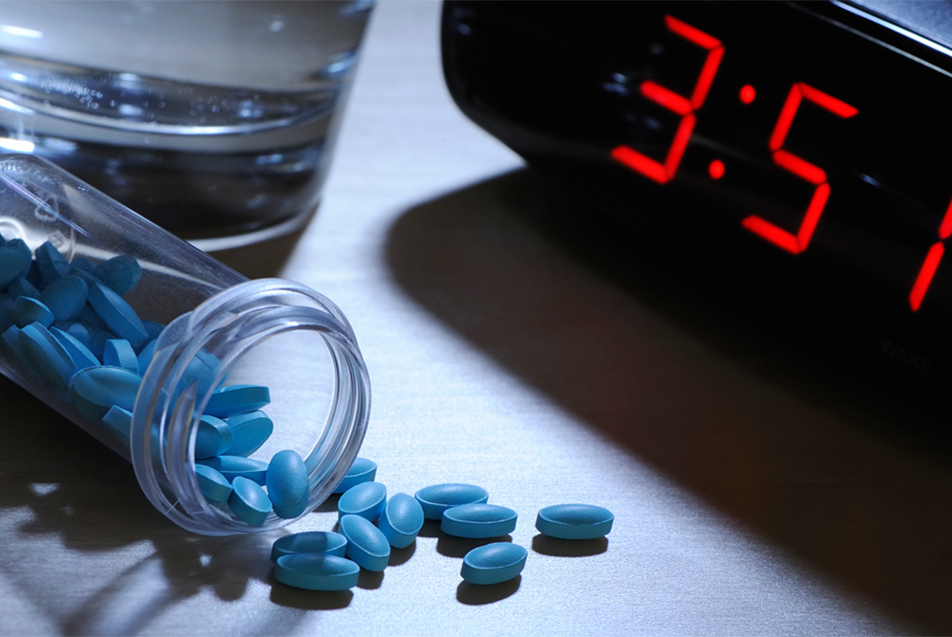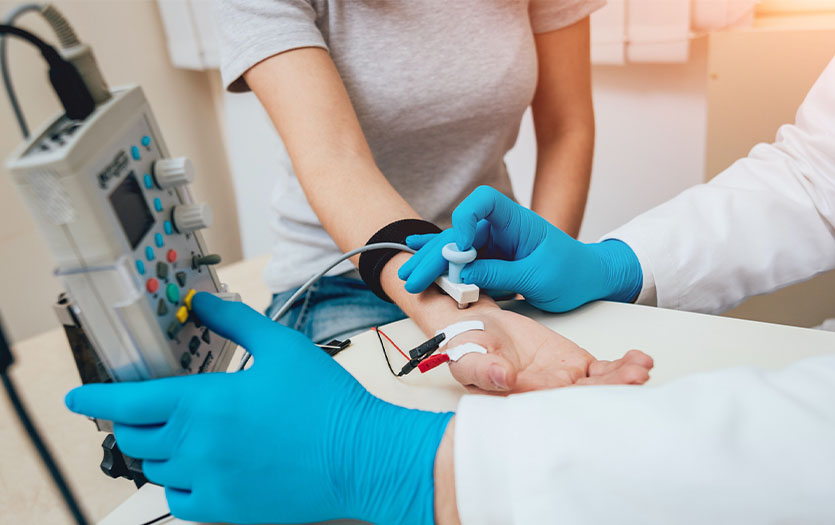When sleep evades us, we’ll do just about anything to settle into a restorative slumber. Often, that means sleep aids. But how safe are these medications? And what do we need to know if we plan to use them? We asked Aaron Roberts, MD, PPG – Sleep Medicine, to tell us more.
If you are reading this article, there is a good chance that you or someone you know have dealt with trouble sleeping at some period in your life. Studies have shown that 30-35 percent of individuals have suffered from short-term insomnia and 10 percent go on to develop chronic insomnia. Most of the time, insomnia will resolve on its own, but many people turn to sleeping pills to alleviate their sleep difficulties. While these medicines can provide a quick fix, there are also many dangers associated with them.
The options.
Sleeping pills come in all shapes and sizes ranging from over-the-counter diphenhydramine (Benadryl®) to controlled prescription drugs such as zolpidem (Ambien). Most of these drugs are regulated by the FDA although not all. Melatonin, for example, is not. Some are indicated for treatment of insomnia while others are used off-label. There are medications to help you fall asleep, stay asleep, or do both. Below is a list of FDA-approved medications for treatment of insomnia.
Generic name (brand name)
Benzodiazepine receptor agonists/Benzodiazepines immediate release
Estazolam (ProSom®)
Flurazepam (Dalmane®)
Quazepam (Doral®)
Temazepam (Restoril®)
Triazolam (Halcion)
Nonbenzodiazepines Immediate Release
Eszopiclone (Lunesta®)
Zaleplon (Sonata)
Zolpidem (Ambien)
Nonbenzodiazepines extended release
Zolpidem ER (Ambien CR)
Nonbenzodiazepines alternate delivery
Zolpidem oral spray (Zolpimist)
Zolpidem sublingual (Edluar™)
Zolpidem sublingual (Intermezzo)
Selective melatonin receptor agonist
Ramelteon (Rozerem)
Selective histamine H1 receptor antagonist
Doxepin (Silenor®)
Dual orexin receptor antagonist
Suvorexant (Belsomra®)
The risks.
A major problem with sleeping pills are side effects. Almost all the medications listed above can cause prolonged drowsiness, daytime memory and performance problems, dizziness, lightheadedness, headaches, nausea, vomiting, diarrhea, severe allergic reactions, skin rash, and abnormal sleep behaviors such as sleep-driving and sleep-eating. Some side effects are more unique to certain medications. For example, many people who take Ambien will do things they do not remember. This includes activities like driving, cooking, eating, shopping, and even having sexual intercourse. Benzodiazepines can suppress your breathing while you sleep and are linked to an increased risk of dementia and falls in the elderly population. These effects are exacerbated when mixed with other substances, such as alcohol.
Another major problem is the metabolism of these drugs can vary depending on your age and gender. In 2013, the FDA lowered the recommended dose for women taking Zolpidem (Ambien) from 10mg to 5mg nightly due to their slower metabolism. Similarly, in 2014, the FDA updated the recommended dose of Eszopiclone (Lunesta) to 1mg at bedtime for both men and women, citing the previously recommended dose of 3mg can cause impairment to driving skills, memory, and coordination that can last more than 11 hours after receiving an evening dose. Higher doses of any medication should only be taken with extreme caution and close monitoring.
Addiction.
Although less common, addiction is another possible risk of taking these medications. Sometimes after taking a sleeping pill for a long time, your body will “get used to it” and you will find yourself taking more to get the same initial benefit (with or without your doctor’s knowledge). The problem is the higher dose usually does not provide more benefit and often will increase the risk for adverse effects. Other times your body becomes dependent on the sleeping pill and you will get rebound insomnia if you try to discontinue it. This can lead to more problems than you had before starting the sleeping pill.
The best way to get to bed.
So, what do you do if you cannot sleep and want to avoid sleeping pills? The gold standard for treatment of chronic insomnia is cognitive behavioral therapy (CBT-I). It is the only scientifically proven non-drug treatment for insomnia. Head-to-head studies comparing CBT-I with sleeping pills show it is more effective and does not have the associated risks of side effects and interactions previously discussed. CBT-I improves sleep in 75-80 percent of participants and reduces or eliminates the need for sleeping pills in the clear majority. While there may not be enough practitioners to provide CBT-I to everyone who needs it, there are online programs that have been shown to be just as effective.
If you constantly find yourself having trouble falling asleep or staying asleep, contact your primary care physician. You may have an underlying medical or psychiatric disorder that needs further evaluation. If you have primary insomnia and end up choosing a sleeping pill to help you sleep, be sure to take it only as prescribed by your doctor and do not mix it with alcohol or other sedating substances. These medications do not address the underlying problem and should only be used as a short-term treatment. For treatment of chronic insomnia, ask your doctor about cognitive behavioral therapy for insomnia (CBT-I).




